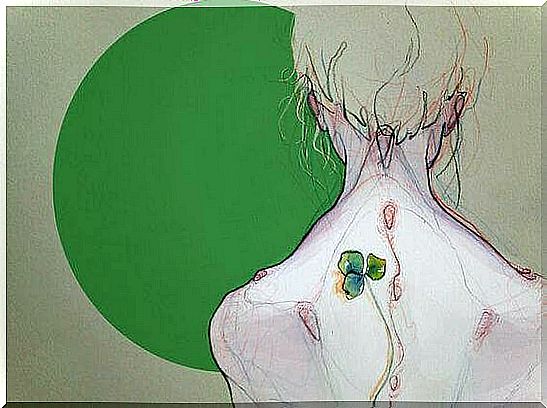Psychosomatic Disorders: When The Mind Hurts Our Body

Psychosomatic disorders are proof of the impact that the mind can have on our body. These are states in which a series of real physical symptoms clearly appear related to invisible diseases, with conditions that do not exist organically, but which are the result of mental conflicts, of unresolved problems that consume us of the inside.
To read that there are students who, due to anxiety, can lose their sight right before an exam can seem incredible. In addition, talking about the case of a 60-year-old woman who lost mobility in her legs because she was convinced that she had a tumor in her spine, can also seem like an exaggerated story and difficult to understand.
However, the evidence is there and such cases are happening every day, all over the world and every moment. As a result, neurologists or psychologists specializing in psychosomatic disorders have quickly learned to give space to patients’ accounts of what happens to them. If they say they feel pain, the pain is probably real even if it is not reflected in an MRI or blood test. Giving credibility to the suffering of these patients is essential. The same goes for people who claim to have suicidal thoughts during depression, or for someone with schizophrenia who reports having visions and certain hallucinations. This reality exists, exists in the mind of said patient and can become devastating. When our mind takes control, is traumatized or subjected to a very convulsive state of anxiety, anything can be possible.

Psychosomatic disorders, is it true that it’s all in my head?
Psychosomatic disorder is defined as the symptomatic setting where a physical or organic correlate is not found, where all the ailments and limitations from which the person suffers are exclusively due to their mental processes. Now let’s think about what that might imply… is it all really all in my head?
The reality is that today psychosomatic disorders remain a field of study filled with unknowns for experts. What is known is that this spectrum of physical disorders associated with mental stress has a cerebral correlate : the overactivity of nerve impulses from the brain to communicate with various areas of our body.
- An excess of adrenaline in the blood can also occur, in addition to certain modified biological parameters such as the acceleration of the metabolism of glucose or amino acids …
- In addition, it has also been shown that there are people more likely to suffer from psychosomatic disorders. Patients living in a state of great anxiety or who have experienced a traumatic childhood as a result of abuse, emotional deprivation, etc., are also more likely to suffer from this type of disorder.
Beyond understanding or not understanding the consequences of psychosomatic illnesses, there is an even more important fact. Think of a doctor who explains to his patient that what he is suffering from is not real, that the pain in his chest is not a heart attack, that the loss of his voice is not due to a problem with his vocal cords, or his terrible migraine to a tumor. It is advisable to specify to the patient “what he does not suffer from”, but… in what way is it possible to help him to heal what he “suffers” and which originates in his mind?
What our mind can generate
Psychosomatic disorders can affect any organ, system, tissue or structure. Its impact is immense, which is why we should not underestimate the power of our psyche. It is also necessary to differentiate somatoform disorders from psychosomatic disorders. While there is never a physical symptom in the first case, visible damage in the body (eg ulcers) appears in the second.
- A classic example of psychosomatic disorders are skin diseases, such as eczema, urticaria, infections, acne…
- Another symptom is hypertension, tachycardia, a feeling of suffocation or perforation of the heart.
- Disorders of the digestive system are very common, with irritation of the gut and ulcers being the most common conditions.
- Severe headaches, such as migraines are also very common
- Memory loss
- Bronchial asthma
- Dysmenorrhea, menstrual disorders …
- Alopecia
- In extreme cases, some people may suffer from temporary blindness, lack of mobility of certain limbs, fainting …

How are psychosomatic illnesses treated?
Psychosomatic disorders are approached in two different ways. On the one hand, it is obviously necessary to take charge of the physical symptom presented by the patient (ulcer, infection, eczema, etc.). Then, most important in these cases is to face the real underlying problem, its psychological universe and this unresolved mental tension which is somatized with more or less seriousness in the organism.
The techniques used for these cases are multiple and will always depend on the personal reality of each patient. It is also sometimes appropriate to try different therapies to determine what works best for the patient, which generates the most positive and expected results.
- Relaxation techniques are always very effective.
- Cognitive behavioral therapy is a great help in getting patients to learn new ways to cope with their problems. They will understand their internal realities, apply realistic life goals, and identify thought patterns that they should change to have a more positive lifestyle.
- On the other hand, another type of therapy which generally brings positive results when it comes to mental and emotional conflicts, as well as anxiety disorders, is psychoanalysis.
- Group therapy such as psychodrama, created at the time by Jacob Levy Moreno, is another ideal, revolting and very rewarding strategy that can be tested to see if it produces the desired results.
In conclusion, we must point out the importance and the challenge for many physicians to try to offer a solution for all those who today suffer from psychosomatic illnesses. Sometimes these are very harsh realities that deserve our attention and awareness.









